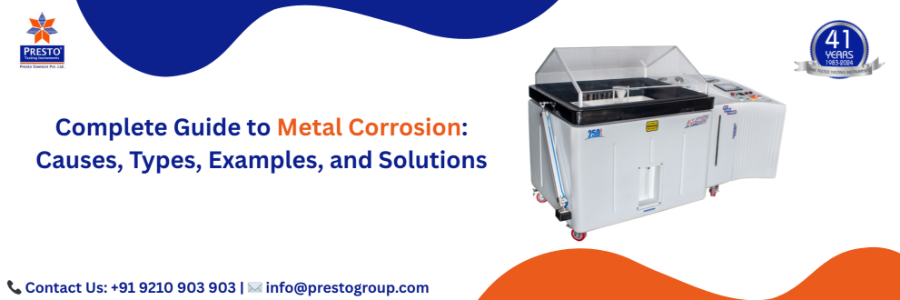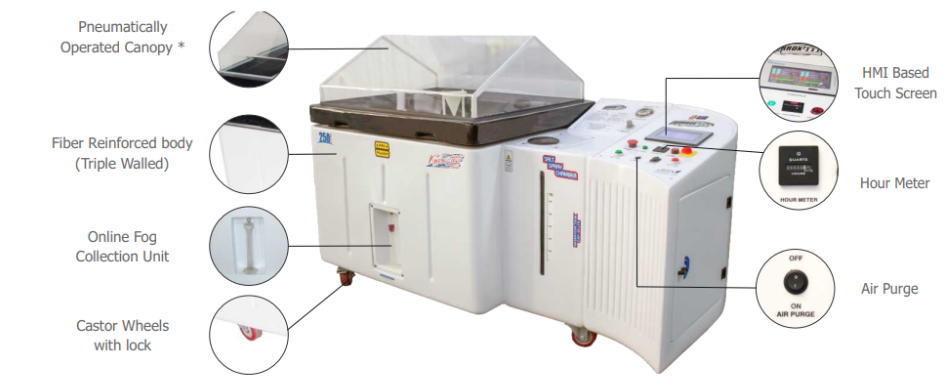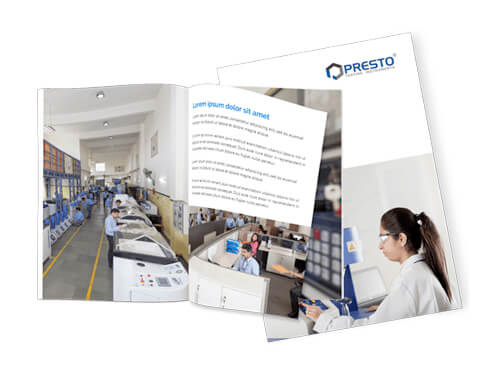Complete Guide to Metal Corrosion: Causes, Types, Examples, and Solutions

Vishal Malhotra-Testing Instrument Expert
14-06-2025
Corrosion of metals is something every industry faces at some point. From pipelines to packaging – when metals degrade– the results can be costly. That is where corrosion testers come into the picture. These machine help companies test how their materials will react to different environments and prevent damage before it is too late.
In this blog: we will walk you through what metal corrosion is, what causes it, the types of corrosion, and how modern corrosion testing equipment (like the Salt Spray Chamber) plays a big role in fighting back.
What is Corrosion of Metals?
Corrosion is when metal starts to break down because of chemical reactions with its surrounding environment—usually air, moisture, or other chemicals.
Example:
Iron reacts with water and oxygen to form iron oxide, commonly known as rust. This rust slowly eats away at the metal, making it weaker and unsafe over time.
Why is Metal Corrosion a Big Deal?
Corrosion isn’t just about looks (though rusted surfaces don’t look great). It’s about functionality, safety, and money. Here’s what makes it such a big concern:
- Breakdowns – Corroded machine parts fail unexpectedly.
- Shorter Lifespan – Products wear out faster.
- Money Loss – Global industries lose billions every year to corrosion-related issues.
- Poor Appearance – Products look old or damaged, reducing customer satisfaction.
Common Types of Metal Corrosion
Here’s a simple table explaining the types of corrosion you’re most likely to encounter:
| Type | What Happens |
| Uniform Corrosion | The entire surface wears out gradually over time |
| Galvanic Corrosion | Two dissimilar metals in contact degrade in salty moisture |
| Pitting Corrosion | Tiny holes form in specific spots |
| Crevice Corrosion | Occurs in tight spaces with trapped moisture |
| Intergranular Corrosion | Impacts the grain boundaries in metals |
| Stress Corrosion Cracking | Cracks appear due to a combo of stress and corrosion |
What Causes Metal Corrosion?
Corrosion has many triggers, both external and internal.
External Factors:
- Humidity or moisture
- Salt (from seawater or road de-icing)
- Chemical exposure
- Fluctuating temperatures
- Physical damage
Internal Factors:
- Type of metal used
- Surface condition (polished or rough)
- Heat treatments during manufacturing
- Leftover stresses from welding or machining
What is a Corrosion Tester?
A corrosion tester is a specialized machine used in R&D labs, QA departments, and factories. It mimics harsh conditions like salty air, humidity, or high temperatures to see how well metals and coatings perform over time.

Key Features of Corrosion Testers:
- Precise control over salt, humidity, and temp
- Long-duration testing (up to 1000+ hours)
- Auto-reporting & analysis tools
- Complies with standards like ASTM B117, ISO 9227
Used In:
- Automotive (testing body panels & parts)
- Aerospace
- Electronics
- Packaging
- Paint & coating industry
Salt Spray Test: The Industry’s Favorite
One of the most trusted corrosion tests is the salt spray test. Performed inside a Salt Spray Chamber, it exposes materials to a continuous fog of salty mist to speed up corrosion.
Why Use a Salt Spray Chamber?
- Mimics marine or industrial environments
- Great for coating performance testing
- Offers repeatable and fast results
- Helps predict long-term durability
Presto's Salt Spray Chamber is widely trusted for this very reason. It gives consistent, reliable results that industries count on.
How to Choose the Right Corrosion Tester?
Not all corrosion testers are made equal. Here's what you should check:
- Standard Compliance: Must support ASTM, ISO testing needs.
- Test Volume: Ensure it fits your samples comfortably.
- User Interface: Touchscreen, programmable cycles save time.
- Durability: Inner build should resist corrosion too.
- Data Output: Can it export reports easily?
Benefits of Corrosion Testing
- Improved Reliability – Assure product strength before launching.
- Less Downtime – Stop corrosion before it causes real damage.
- Faster R&D – Accelerate innovation with simulated aging.
- Quality Assurance – Detect flaws in batches early.
Real-Life Case Study
A packaging company noticed foil seals rusting before their products reached consumers. Using a Salt Spray Chamber, they discovered a flaw in the coating application. After fixing it, shelf life increased by 35% and complaints dropped by 50%.
Quick Comparison of Corrosion Types
| Corrosion Type | Appearance | Cause | Industries |
| Uniform Corrosion | Even surface rust | General moisture exposure | Construction, Automotive |
| Galvanic Corrosion | Local damage | Contact between dissimilar metals | Plumbing, Marine |
| Pitting Corrosion | Small holes | Localized stagnant moisture | Oil, Petrochemical |
| Crevice Corrosion | Hidden rust in gaps | Fluid trapped in joints | Aerospace, Packaging |
Why Presto Stantest Salt Spray Chamber is No. 1 in India
Presto's Salt Spray Chamber is considered India’s most reliable corrosion testing solution. It’s known for:
- High precision controls
- Durable, rust-proof design
- Easy operation & automated reports
- Compliance with global testing standards
Top manufacturers across auto, paint, packaging, and metals trust Presto to deliver accurate corrosion data that guides real product improvement.
FAQs – Corrosion & Testing Explained
1: What does a corrosion tester actually do?
Ans: It simulates moisture, salt, or heat exposure to test how metals or coatings behave over time.
2: Why is the salt spray test important?
Ans: It helps industries predict how long a product or coating can last in harsh conditions like coastal or industrial areas.
3: Who needs corrosion testing?
Ans: Industries like automotive, aerospace, electronics, packaging, and even construction all rely on it for safety and durability.
4: How long does a salt spray test take?
Ans: It varies! Some tests go for 24 hours; others continue for 1000+ hours, depending on the product’s use case.
5: What are common corrosion examples?
Ans: Rusted gates, battery leakage, green copper stains on pipes, silver tarnish—these are all signs of metal corrosion in daily life.
6: Can corrosion be good in any way?
Ans: Rarely, yes! Like the protective oxide layer on aluminum or biodegradable metals used in medical implants.
Why Corrosion Testers Matter: A Recap
Whether you are in automotive, electronics, packaging, corrosion testing is something you just can not skip. It gives you the power to predict, prevent, and protect.
With trusted machines like the Presto Salt Spray Chamber, you can test confidently, develop durable products, and save time, money, and your reputation.
Get the Best Salt Spray Chamber for Your Needs!
Looking for the right Salt Spray Chamber at the best price?
Call Us: +91 9210 903 903
Email: info@prestogroup.com
Our corrosion experts will help you pick a tester that meets your industry standards., budget, and testing goals.
Recent News
- Paper & Packaging Testing Instruments
- Paint, Plating & Coating Testing Instruments
- Plastic & Polymer Testing Instruments
- Environmental Testing Chambers
- PET & Preform Testing Instruments
- Color Measuring Testing Instruments
- View Entire Range Instruments

Catalogue 2023
Get information about new product launches, research, innovation and endeavors at Presto.
download Free CopyNeed more information
Connect with us for your business enquiries. Generally we respond within one or two working days.
send enquiriesContact Us
Get a Quote
